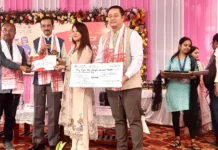[ Taba Ajum ]
It is that time of the month when my turn to pen down ‘Monday Musing’ has arrived, and this time the events of the last few months have been an inspiration for me.
As it is the festive season, more accidents are being witnessed in the streets of the capital complex. Some of these are due to drunk driving, some due to negligent driving, and a few due to sheer misfortune.
Whatever may be the reason, the fact remains that an accident is an accident, and nobody does it deliberately. In fact, such is the trauma of being involved in an accident that, whether one is at the receiving end or is the cause of it, it leaves you emotionally distressed for a long time.
Usually, when there is an accident on the road the first thing one does is to ensure that everyone is fine, and after that check who is at fault, and then maybe involve the police, if needed. But in Arunachal, especially in the capital complex, the first thing people do after an accident is call up fellow clan members, and then start intimidating in order to seek hefty fines.
Recently, I was involved in an unfortunate accident. I took the moral responsibility, blaming myself for it, offered sincere apologies, and the matter was sorted out peacefully.
But what shocked me during the course of the negotiation was the outrageous behavior of some of the members of the victim’s family and friends. One of the relatives even told me, “Aapko mera behen ka pura lifetime ka risk lena parega.” I too had been injured and my vehicle was also severely damaged. I wondered how I could take the responsibility for another person’s entire life when I couldn’t be sure whether I myself would be alive the next day.
Thankfully, better sense prevailed with the intervention of a few learned elders, who played a crucial role in bringing an amicable solution to the whole issue.
What I wish people to learn from these experiences is that an accident should be treated as an unfortunate tragic incident and no one should use it to bully or intimidate others, or see it as an opportunity to fleece money. You may get a new vehicle or a lot of money from it, but the person paying it does so with a lot of bitterness, especially if they are made to pay by using intimidating tactics. Especially for the middle class people, paying a hefty amount as fine leaves behind a trail of emotional stress.
In Arunachal we call it the ‘fine system’, but in the rest of the world, taking money for an accident is known as ‘blood money’, and is considered a sin. This ‘fine’ culture has severely damaged the reputation of the state, particularly that of Itanagar and the adjoining capital region.
In fact, vehicles coming from Assam and other parts of the state dread to enter the capital. The community-based organizations should concentrate on eradicating such kinds of social evils from the society.
Another thing which the Arunachalee society definitely needs to get rid of is the worshipping of goons as heroes. Here the law abiding citizens are treated as weak and those who break the laws are portrayed as some kind of heroes. If this trend continues, the young generation would prefer to be goons rather than good citizens. Protection given to antisocial elements by clan and community members should be put to an end.
Remember, Osama Bin Laden was also once considered a good terrorist and was backed by America just to check the Soviet Union (now Russia); but he came back to haunt them. Who knows who will be at the receiving end of these antisocial elements?

